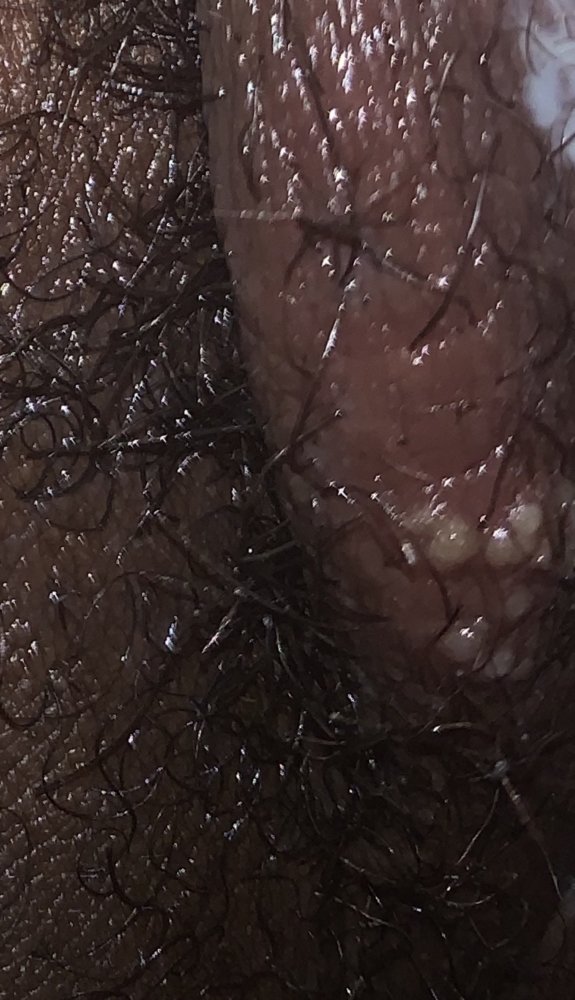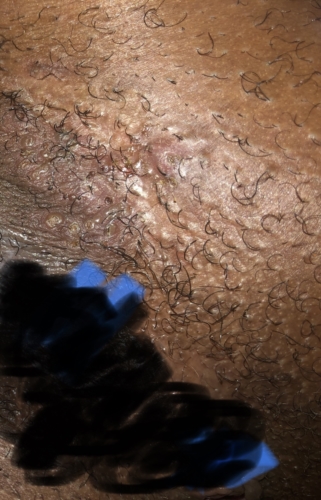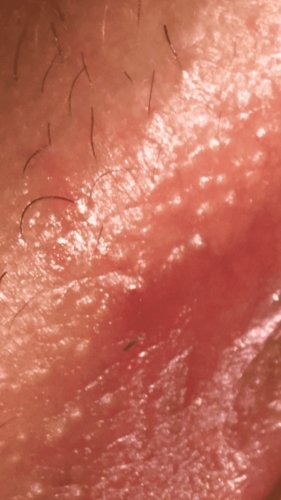What You Can Do
Before your appointment, you might want to list answers to the following questions:
- What are your symptoms? When did they start?
- Do you have a new sexual partner or multiple partners?
- Have you ever been diagnosed with a sexually transmitted infection?
- Do you regularly use condoms?
- What medications or supplements do you take regularly?
Some basic questions to ask your doctor include:
- What tests do I need?
- Should I be tested for other sexually transmitted infections?
- Should my partner be tested?
- Do I need to abstain from sexual activity during treatment?
- How can I avoid infecting my partner?
When To Seek Help For Herpes Symptoms
If your herpes symptoms are bothersome or youre worried about giving someone else the virus, see your doctor or another healthcare provider.
Antiviral medications can help make genital herpes sores go away faster, reduce the number of outbreaks, and lower the risk of transmission.
Consistent use of condoms and dental dams during sex also lowers but doesnt eliminate the risk of transmitting the virus.
If you dont have a primary care doctor or gynecologist, you can find expert advice at a Planned Parenthood clinic or a community health center.
Frequent Or Burning Urination: Is This Herpes
When one of our bodily functions stops working as expected, it can be quite alarming. Urination is one of those essential functions necessary to keep us alive. It involves expelling liquid waste from our body in the form of urine, or pee, as it is more commonly known. For most, the bladder holds urine until it signals that they have to expel the urine. Urination should be a simple and painless process that you dont even have to think about.
Also Check: How Can You Tell If You Have Genital Herpes
Path To Improved Health
There are several conditions that can cause painful urination. The most common is a urinary tract infection . The urinary tract consists of the kidneys, bladder, and urethra. The urethra is the tube that carries urine out of the body. Bacteria can build in the tract when waste isnt removed or the bladder isnt emptied correctly. This causes an infection. Swelling and irritation from the infection can make urination uncomfortable.
Sometimes painful urination can occur even if you dont have a UTI. Other causes include:
- Medicines. Certain medicines, like some used in cancer chemotherapy, may inflame the bladder.
- Something pressing against the bladder. This could be an ovarian cyst or a kidney stone stuck near the entrance to the bladder.
- Vaginal infection or irritation.
- Sensitivity to chemicals in products. Douches, vaginal lubricants, soaps, scented toilet paper, or contraceptive foams or sponges may contain chemicals that cause irritation.
- Sexually transmitted infections. Gonorrhea, chlamydia, or herpes can cause urination to be painful for some people.
- Prostate infection
What Are The Treatments For Chlamydia

Antibiotics will cure the infection. You may get a one-time dose of the antibiotics, or you may need to take medicine every day for 7 days. Antibiotics cannot repair any permanent damage that the disease has caused.
To prevent spreading the disease to your partner, you should not have sex until the infection has cleared up. If you got a one-time dose of antibiotics, you should wait 7 days after taking the medicine to have sex again. If you have to take medicine every day for 7 days, you should not have sex again until you have finished taking all of the doses of your medicine.
It is common to get a repeat infection, so you should get tested again about three months after treatment.
You May Like: What Cream Is Good For Genital Herpes
Burning With Urination From Herpes Outbreak
Ask U.S. doctors your own question and get educational, text answers â it’s anonymous and free!
Ask U.S. doctors your own question and get educational, text answers â it’s anonymous and free!
HealthTap doctors are based in the U.S., board certified, and available by text or video.
How Genital Herpes Is Passed On
Genital herpes is very easy to pass on from the first tingling or itching of a new outbreak to when sores have fully healed.
You can get genital herpes:
- when there are no visible sores or blisters
- if a cold sore touches your genitals
You can’t get genital herpes:
- from objects such as towels, cutlery or cups the virus dies very quickly when away from your skin
Also Check: How To Help Herpes Heal
You Ate Something Thats Causing The Burning
Believe it or not, what you eat or drink can potentially produce painful urination, Dr. Horton says.
Spicy or acidic foods, including citrus fruit like oranges, lemons, limes and grapefruit, as well as caffeine and alcohol can irritate the bladder and trigger burning when you pee, she says.
âFix it:â Because not all people are affected by the same food or drinks, it is helpful to keep a food diary to track which things caused you a twinge on the toilet, Dr. Horton says.
Another smart strategy: Drink lots of water to dilute your urine. “Very concentrated urine can also cause discomfort and burning,” Dr. Horton says.
You Can Only Get Genital Herpes If Your Partner Has An Active Infection With Sores Right Wrong
A person can be exposed to the virus and pass it to someone else without ever having symptoms. It happens more often than youd think. Thats because the virus can exist in genital fluids even without any ulcers. This is called “asymptomatic shedding of virus.” Although there is a lot more active virus when there are sores, asymptomatic shedding is probably how most people get herpes. Whats more, only one out of four people who tests positive for genital herpes actually knows that they have the virus. Thats a lot of people. Combine the two and you have many people unknowingly infecting others.
Many people who learn they have genital herpes are shocked. They often didnt see any sores on their partner or that their partner had never had any ulcers, ever. This is common and true, because people can have genital herpes and not know it.
You May Like: What Foods To Avoid With Herpes
Genital Herpes: The Painful Facts About A Tricky Virus
There are two main types of herpes simplex virus infections, HSV-1 and HSV-2. Generally speaking, HSV-1 is responsible for those annoying cold sores that can pop up during times of stress or lack of sleep. Genital sores are usually caused by HSV-2. Many people dont realize that HSV-1 can cause genital ulcers as well, though these tend to be less severe and less likely to recur.
It can take as little as a few days and up to a week after a person has been exposed before any herpes symptoms appear. First, there will be redness and tingling, followed by small painful bumps that progress to fluid-filled “blisters.” Eventually, these burst to form shallow skin ulcers which then crust over, with gradual healing over a couple weeks. An initial genital herpes infection can be very painful, also cause fever, body aches and fatigue. Recurrent outbreaks tend to cause less severe symptoms. Rarely a genital herpes infection can cause inflammation of the membrane that covers the brain .
How Can You Prevent Sexually Transmitted Infections
Here are some ways to help prevent STIs.
- Limit your sex partners. Sex with one partner who has sex only with you can reduce your risk of getting an STI.
- Talk with your partner or partners about STIs before you have sex. Find out if they are at risk for an STI. Remember that it’s possible to have an STI and not know it.
- Wait to have sex with new partners until you’ve each been tested.
- Don’t have sex if you have symptoms of an infection or if you are being treated for an STI.
- Use a condom every time you have sex. Condoms are the only form of birth control that also helps prevent STIs.
- Don’t share sex toys. But if you do share them, use a condom and clean the sex toys between each use.
Vaccines are available for some STIs, such as HPV. Ask your doctor for more information.
Recommended Reading: Can You Get Pregnant With Herpes
Symptoms Accompanying The Burning Urination
Depending on the underlying cause of your dysuria, you may experience certain symptoms. The following are some symptoms that may accompany burning during urination.
- Post-micturition dribble passage of small quantities of urine after urinating
- Difficulty urinating such as straining or hesitancy
- Pelvic and lower abdominal pain
Testing For Genital Herpes

If you think you may have genital herpes you should make an appointment with your GP or local sexual health services.
If there are symptoms present such as blisters, sores and ulcers, your doctor or nurse may be able to make a diagnosis straight away.
If you have visible blisters, your doctor or nurse may take a swab for testing, to check if this is herpes and what type. This swab can also test for another STI which causes blisters called syphilis.
The genital herpes swab tests are very reliable, though if the ulcer is too dry then it may be less likely to find a positive result.
Don’t Miss: Do Herpes Outbreaks Eventually Stop
Does Herpes Burn When You Pee
Herpes is a contagious infection which is caused by the Herpes Simplex Virus. Consisting of HSV1 and HSV2, which are oral and genital herpes, respectively, it is important to know that herpes is not curable. That being said, people have always had one question when it comes to genital herpes- does herpes burn when you pee?
To answer this question, yes, herpes does burn when you pee. However, you need to remember that its not necessarily true that you have herpes if you feel a burning sensation when you pee. It could also be a UTI or another STD when you feel a burning sensation while peeing.
First of all, if you see some blisters or sores around your genitals, you might want to get yourself tested. When the outbreak happens, you will experience symptoms like tingling, numbness, or burning sensation in the genital areas. This is when you can guess that you have got herpes.
You might want to know, why does herpes burn when you pee? The reason why herpes burns when you pee is that your urine is likely touching the sores. You may also experience difficulty urinating when the swells and sores block your urethra.
Top three reasons to consider testing yourself for an STI
Home Remedies To Treat Burning Urination
While it is always a good idea to seek the aid of a medical professional when dealing with a potential urinary tract infection, other causes that may lead to a burning urine sensation may be treated with some home remedies. The following are some you can try yourself.
Stay hydrated: By drinking adequate amounts of water, you can ensure that your kidneys are passing enough urine to get rid of any foreign invaders that may have attached to your urinary tract. Dehydration is also a common cause of burning during urination. It is recommended to drink two to three glasses of water in very short intervals.
Drink cranberry juice: This is a common remedy to help cure minor UTI symptoms. It is thought that the citric acid that cranberries contain help to kill UTI-causing bacteria.
Coconut water: A great cure for dehydration and burning urine. Coconut water contains many important electrolytes that are great for keeping your body fluids in balance.
Use protection during sexual intercourse: One the most common ways for contracting a urinary tract infection is through sexual intercourse, especially for women. By using condoms, you can help mitigate this risk to some degree.
Urinate when you must: It is a good idea to not hold in urine, as it may help bacteria propagate
Blueberries: Rich in antioxidants that help eliminate bacteria and heal infections.
You May Like: Over The Counter Meds For Herpes Outbreak
Can Genital Herpes Be Prevented
The only sure way to keep from getting genital herpesor any other sexually transmitted infection is to not have sex. If you do have sex, practice safer sex.
- Before you start a sexual relationship, talk with your partner about STIs. Find out whether he or she is at risk for them. Remember that a person can be infected without knowing it.
- If you have symptoms of an STI, dont have sex.
- Dont have sex with anyone who has symptoms or who may have been exposed to an STI.
- Dont have more than one sexual relationship at a time. Having several sex partners increases your risk for infection.
- Use condoms. Condom use lowers the risk of spreading or becoming infected with an STI.
- Dont receive oral sex from partners who have cold sores.
Taking medicine for herpes may lower the number of outbreaks you have and can also prevent an episode from getting worse. It also lower the chances that you will infect your partner.
If you are pregnant, you should take extra care to avoid getting infected. You could pass the infection to your baby during delivery, which can cause serious problems for your newborn. If you have an outbreak near your due date, you probably will need to have your baby by cesarean section. If your genital herpes outbreaks return again and again, your doctor may talk to you about medicines that can help prevent an outbreak during pregnancy.
Recommended Reading: Azithromycin 500 Mg Dosage For Chlamydia
Herpes: 10 Signs To Look For
Herpes is an infection caused by the herpes simplex virus type 1 or 2. The part of the body affected by the virus denotes the type of infection. Herpes has cyclical episodes, with dormancy following a period of active symptoms.The first episode is usually the most severe, and symptoms may take two to four weeks to heal. Signs of herpes may not develop immediately after an individual contracts the virus, but noting symptoms and seeking treatment is essential to ensure one does not spread the infection.
Also Check: Can Genital Herpes Be Cured With Antibiotics
Talk To A Primary Care Doctor Now For A Personalized Answer To Your Dermatology Question
Trusted by millions since 2010
Related questions
Found in:
People also asked
You Have Atrophic Vaginitis
While a drop in estrogen and vaginal dryness is most common in menopausal people, those who are perimenopausal, breastfeeding or taking certain types of birth control can also experience atrophic vaginitis, Dr. Horton says.
In addition to vaginal dryness and burning with urination, atrophic vaginitis can also cause symptoms such as the following, per the Mayo Clinic:
- Unusual vaginal discharge
- Shortening and tightening of the vaginal canal
âFix it:â While many postmenopausal people experience these symptoms, few seek help, as they’re too embarrassed to discuss their situation with their doctor, per the Mayo Clinic.
But you don’t have to suffer silently with this condition âthere are effective treatments available. “Hormone therapy or vaginal estrogen cream can help reduce the dryness, restore a normal vaginal pH and alleviate vaginal burning and painful urination,” Dr. Horton says.
Don’t Miss: Incubation Period For Oral Herpes
How Is Chlamydia Diagnosed
The most common test for chlamydia is called a nucleic acid amplification test . Your provider takes a sample of fluid by doing a vaginal/cervical swab or collecting a urine sample. Then, they send the sample off to a lab to check for the bacteria that causes chlamydia. Your provider may do the test in an office, or they may ask you to do an at-home chlamydia test. Follow your providers instructions carefully to ensure you get accurate test results.
Because most chlamydia cases are asymptomatic, its important to get screened for chlamydia even if you dont notice any signs of infection. The CDC recommends that sexually active cisgender women who are high-risk for chlamydia get screened regularly. Women, more so than men, experience the most severe complications from chlamydia. Transgender men and nonbinary individuals with vaginas should be screened regularly, too, as they can experience the same complications of chlamydia.
Youre considered high-risk if you:
- Have had chlamydia infections previously.
Cisgender men, or trans and nonbinary individuals with penises, should be screened for chlamydia if:
- They live in a setting where chlamydia spreads frequently, like correctional facilities, adolescent clinics and sexual health clinics.
- They have sex with other men.
Recommended Reading: Is Chlamydia An Std Or Sti
Burns When You Pee Heres What Your Bodys Trying To Tell You

Peeing should never be painful. So if you’re wincing when you wee or your urine feels like hot lava erupting from a volcano, something’s definitely up down there.
Video of the Day
A burning or stinging pain or discomfort when you pee is known as dysuria and, depending on the origin of the problem, it can occur while you tinkle or even after, according to the Cleveland Clinic. While dysuria is more common in people assigned female at birth , anyone can have painful urination.
We spoke with Jodie Horton, MD, a board-certified ob-gyn and chief wellness advisor for Love Wellness, to answer the âburningâ question: âWhy does it burn when I pee?â Here are the most common causes for dysuria and what you can do to manage painful urination.
Read Also: How To Get Rid Of Herpes Symptoms